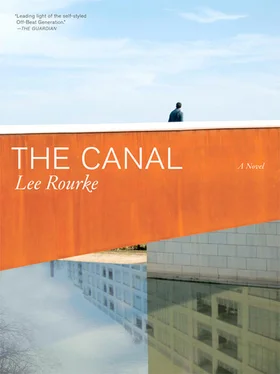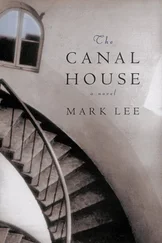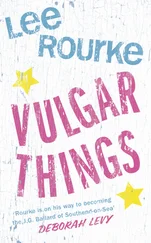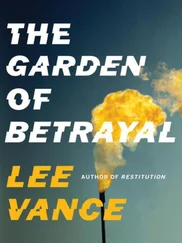I used to think about the future a lot: what it would be like, what we would be doing, what everything would look like. I used to ask anyone who would listen: what do you think the future will be like? They almost always mentioned space travel and exploration in their not too dissimilar answers; technology, computers, micro-thin TVs and other extensions of ourselves. It seemed to me the future had already been mapped out by us, like it had been invented by us, for us, that we already had a clear idea about what it was going to be like. Yet when she spoke to me that day, on the bench, it felt like something had happened, like a new future had be revealed to me, there on the bench beside the towpath and the murky water, the coots, the two swans, and the office workers. It felt like only she knew what was going to happen, what it was going to be like for us. She didn’t look in the least bit surprised when I asked her what she thought the future was going to be like. It’s funny, I may have imagined it, but I am certain the faintest flicker of a smile crept onto her face, a faint curl of the top lip as she turned her face towards mine. I had to ask her.
“What do you think it will be like?”
“The future?”
“Yes, the future … What do you think it will be like?”
“Well, it all depends on what you mean by the ‘ future .’ ”
“I mean exactly that … the future … Everything that is ahead of us. What do you think it will be like?”
“It’ll be just like it is now, only things will look different.”
“What do you mean?”
“Just that. Nothing more.”
She turned back to the whitewashed office block across the murky water. The canal became silent apart from a police helicopter hovering over the city towards Moorgate, hanging in the air like a dragonfly over a dead rat.
She turned to me.
“You’re listening to that helicopter, aren’t you?”
“Yes, I am.”
“I like the sound of helicopters …”
“Me too.”
With this, inching closer again, her breath on my cheek, my neck, she lay her head on my shoulder. A jolt of sheer electricity shot right through me. I contemplated caressing her dark hair. For a short moment nothing existed and it was the two of us. Then, as quickly as it had all disappeared, it all came back into focus: the murky water, the towpath, the discarded cigarette ends by my feet, my aching ribs, the bruises, the whitewashed office block, the expensive flats above, the iron bridge, the coots, the Canada geese, and the swans. All of it was before me as she took her head off my shoulder — like she had suddenly realised that what she was doing was wrong and unnatural — and moved away from me to the other side of the bench.
For a fleeting moment, the cloud passing up above me, above the canal, above the whitewashed office block, reminded me of a giant swan floating gently across the sky. It soon shifted and morphed into something else, something unrecognisable. Yet, before it had shifted across the sky and morphed back into an homogenous shape like every other cloud, the swan figure, floating above me, opened its wings momentarily and then closed them again, slowly, like it was about to lift away. I didn’t really think that much of it at the time, but now that cloud means everything to me: I imagine it over and over again. I search for them in the sky when I get the chance, but they never appear, and I know that it will never happen again, yet I still look up if the clouds are shifting at pace up above me, if I’m near a window — just in case.
I could see them in the distance, up on the walkway by the rusting iron bridge. I was sitting on the bench. I was looking at them through a gap in the privets on my left; they couldn’t see me. It was the same four teenagers who had attacked me. The bright redheaded one, the tall one, and the other indistinguishable two: The Pack Crew. They were throwing things across to the other side of the bank from me, from the walkway, towards the company esplanade of the whitewashed office block, overlooking the murky water. What they were throwing looked like rocks, or possibly half-bricks. One of the teenagers was holding up his mobile phone to film the whole scene. On impact with the hardened concrete of the company esplanade, by a side entrance, the exploding rocks, or half-bricks, collided with a threatening sound: mini-explosions, the sound bouncing back off the concrete and whitewashed façade. For some reason it made me think of all those bodies falling from the World Trade Center, hitting the ground with astonishing force. I couldn’t help it. The rocks, or half-bricks, were being taken from a council building site near the rusting iron bridge. Islington council were repairing a footpath, leaving huge mounds of rubble and general waste in their wake. I remember thinking why the council hadn’t thought to cordon off the area so as to prevent such a thing from happening. There must have been some safety regulations for such a job? As the four teenagers continued to hurl the rocks, or half-bricks, over to the other side of the canal, another teenager appeared. He was on a motor scooter. He wasn’t wearing a helmet. He must have been no older than fifteen years of age. He looked quite menacing, though. Angry, like something bad had happened. He was revving the engine over and over again. The teenager with the phone pointed it towards him, filming him, too. The engine was at breaking point, struggling with the strain of each frantic twist of the throttle — the exhaust was spitting out a thick cloud of fumes and filth. The gang surrounded him, laughing and jeering at something he had said. Then he began to accelerate forwards, bursting through and out of the huddle, up and over the rusting iron bridge at great speed, skidding to a halt at the other side, then, with skill, swinging the scooter around, low, nearly scraping the ground, to face the other way so he could ride back over the bridge again. He did this over and over again. A loud, threatening, manic figure eight. The noise was deafening. The gang, quite unperturbed, resumed their rock, or half-brick, hurling like it was their duty. Like something had told them to do it. Like automatons. The mobile phone still held aloft, still capturing the whole scene to be viewed again at leisure. The boy on the scooter continued his figure eight, revving the engine, pulling at the throttle mercilessly, his wheels burning, sliding across the rubble and bitumen. I watched them for about four minutes, until he lost control of the scooter, hitting something abruptly — probably the kerb, or some breezeblocks. He flew into the air and landed on top of the scooter, both crashing to the ground. I nearly jumped out of my skin. The gang stopped throwing the rocks, or half-bricks, and began to scream, to fall about, laughing in fits, gasping for air, holding their sides — holding on to each other. They all rushed over to the boy. Still filming it. He was lying, dazed, on the scooter. The redheaded lad switched off its engine. Then they picked the boy up. He started laughing, too, and repeatedly kicked the scooter. As soon as this began to happen the gang seemed to lose interest in the rocks, or the half bricks, and, encouraged by the tall lad with the shaven head and the teenager filming it with his mobile phone, began to collectively shout:
“Throw the fucker over! Throw the fucker over! Throw the fucker over! Throw the fucker over! Throw the fucker over! Throw the fucker over! Throw the fucker over!”
At first I thought they meant the boy who had been riding the scooter. It wasn’t until I saw the gang lift the scooter and throw it — managing to beat the railings designed to stop such a thing from happening — over the side of the iron bridge and into the murky water of the canal that I realised what they meant. I watched the scooter fall. It caused a large splash, which startled some coots farther down the canal. They scattered in a cacophony of shrieks, their large feet paddling across the canal like their tiny lives depended on it. The scooter sank to the bottom of the canal. The gang, including the boy, ran away, leaving the scene in more fits of laughter. After I was sure they had gone I got up from the bench and walked over to the water’s edge near the rusting iron bridge. In the middle of the canal, submerged by the murky depths, I could see the scooter lying there, settling on the uneven bed. Swirls of oil began to appear on the surface of the water, shimmering as they caught the light, spiralling in the vortex created by the sinking scooter. My immediate thoughts turned to the coots, the Canada geese, and the swans. Then I began to think about the teenager with the mobile phone.
Читать дальше












